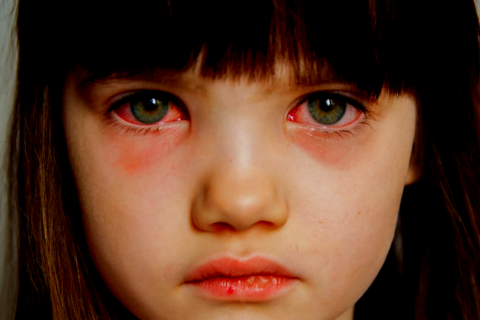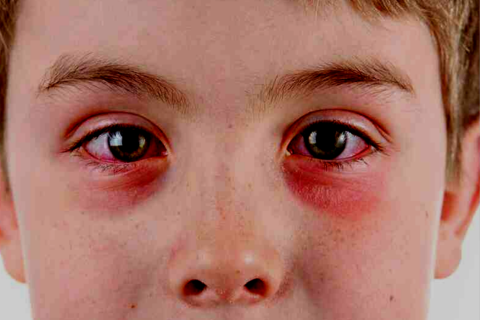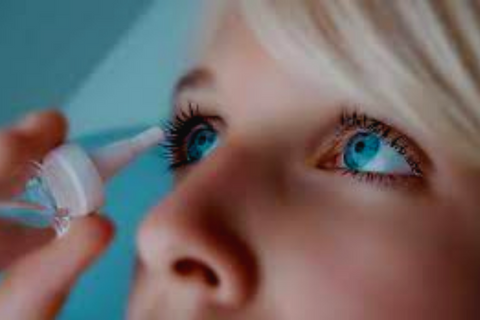
Navigating Monsoon Season: A Comprehensive Guide to Managing Seasonal Eye Allergies
The highly anticipated monsoon season brings in a wave of allergens that can lower our moods in addition to providing relief from the oppressive heat. Seasonal eye allergies take center stage among the many health issues that are coming up currently. As a result of the increased humidity and moisture in the air, allergens can flourish and cause discomfort in individuals who are susceptible. In this blog post, we’ll go into more detail about the relationship between allergies and the monsoon season and give you a variety of practical advice for dealing with and treating seasonal eye allergies.

Understanding Seasonal Eye Allergies
Pollen, mold spores, dust mites, and pet dander can cause seasonal eye allergies, which are medically referred to as allergic conjunctivitis. The monsoon season makes it easier for these allergens to spread through the air and encounter our eyes, which can lead to allergic reactions. Seasonal eye allergies frequently appear as puffiness, redness, itchiness that doesn’t go away, watery eyes, and a gritty feeling. The effects of ignoring these signs on your everyday life and general health can be severe.
Factors Increasing Seasonal Eye Allergies During the Monsoon:
Seasonal eye allergies are more common during the monsoon season for several reasons:
Humidity: The increased humidity levels foster the development of mold and the spread of allergies.
Air dampness: The likelihood of dust mites flourishing and producing allergic particles increases.
Rain: While it removes some allergens from the air, it also breaks up pollen grains, releasing them into the atmosphere and escalating allergy reactions.
Preventative Steps to Fight Seasonal Eye Allergies

Consider using these additional suggestions in addition to the ones previously mentioned to successfully treat seasonal eye allergies during the monsoon season:
Maintain Cleanliness: To reduce the buildup of allergies, regularly clean and dust your living environments. To stop dust mite accumulation, wash rugs, curtains, and bed linens.
Maintain Hydration: Keeping your mucous membranes moist can help prevent the discomfort brought on by dry and itchy eyes.
Choose Cold Compresses: Cold compresses can instantly reduce swelling and itching around the eyes.
Utilize Allergy-Proof Bedding: To build a barrier against dust mites, spend money on hypoallergenic mattress covers and pillowcases.
Think about over-the-counter remedies: Over-the-counter antihistamine eye drops can temporarily relieve allergy symptoms. Before taking any medicine, seek medical advice.
Consult an Allergist: If you have very severe allergies, a consultation with an allergist can help you pinpoint specific triggers and create a tailored management strategy.
Enjoy the Monsoon Season Without the Problems:
You can successfully reduce the negative effects of seasonal eye allergies on your health by knowing how allergies and the monsoon season interact and incorporating these thorough measures into your daily routine. Keep in mind that the secret is to combine preventive measures with hygiene and, where needed, professional counsel. You can enjoy the monsoon season’s natural beauty and tranquility while having eyes that are clear, pleasant, and free from allergies.
Managing Seasonal Eye Allergies
Tips for Managing Seasonal Eye Allergies When Outdoors

Although it might be difficult to resist the charm of the monsoon season’s refreshing showers, people who are prone to seasonal eye allergies should take extra care when participating in outdoor activities:
Choose the Right Time: Plan outside activities for times when pollen levels are lower, typically in the middle of the day after the dew has dried.
Dress Properly: To protect your eyes from inhaling allergens, put on a wide-brimmed hat and a thin jacket.
Eye Protection: For further defense against airborne allergens and rain, think about wrap-around goggles in addition to sunglasses.
Extra Safety Measures for Contact Lens Wearers
The monsoon season might present difficulties for people who wear contact lenses. To ensure comfort and eye health, take the following additional measures:
Change to Daily Disposables: To lessen the chance of allergy buildup on your lenses during this season, think about switching to daily disposable lenses.
Frequent Lens Cleaning: If you decide to keep wearing standard lenses, make sure to give them a thorough cleaning every time to avoid allergens sticking to the surface.
Reduce Lens Wear Time: Wear your lenses for shorter periods of time, especially on days with a high pollen count, to prevent prolonged contact with allergens.
Exploring Natural Remedies:
Some natural remedies can help with seasonal eye allergies in addition to conventional treatments:
Cold Tea Bags: Covering closed eyelids with cooled, moist tea bags will help reduce puffiness and calm inflammation.
Use Aloe Vera Gel: Pure aloe vera gel used around the eyes might have a cooling effect and reduce redness.
Saline Rinse: Gently flush out irritants and ease pain from your eyes using a saline solution.
Seeking professional Help: It’s essential to speak with a healthcare professional if your symptoms continue despite using preventative measures and cures. An eye specialist or allergist can perform a thorough evaluation, pinpoint the root causes, and suggest the best courses of action, including prescription eye drops or allergy needles.
Conclusion
With the help of this guide, you may enjoy the wonders of the monsoon while successfully controlling seasonal eye allergies. You can enjoy the rhythmic music of rain without having allergies by combining preventive measures, lifestyle changes, and expert guidance. Being prepared provides bright, clear, and irritation-free eyes, allowing you to fully enjoy the rainy season. Rain or shine, your unhindered journey continues with clear eyes!
Read Also:Transforming Obesity Care: Affordable New Drugs Deliver Unrivaled Treatment Success
Read Also: Seasonal Allergies








